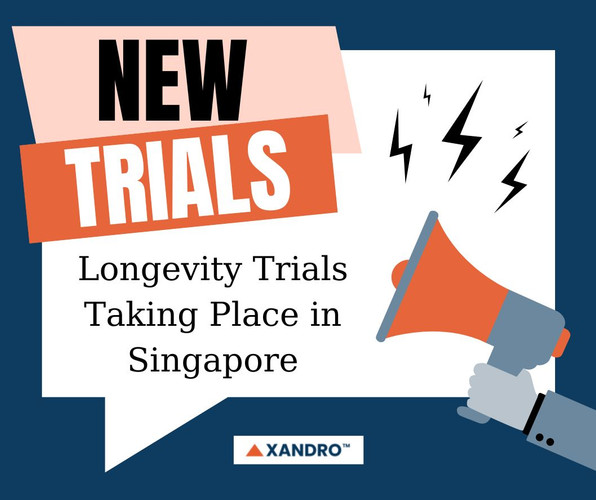Improving Health Span: New Singapore Longevity Trials
31st Jan 2024
New Longevity Trials Taking Place in Singapore
Interest in healthy longevity in the overall public has been increasingly evident over the past couple of decades. From self-monitoring devices like Fitbits and Apple watches to the boom in supplements, people are looking to stay healthy for longer.
The increase in new longevity research and pre-clinical and clinical longevity trials showing proof that we can actually increase our lifespan, even if only minutely, has further driven longevity interest.
Dr Andrea Maier, co-director of the Centre of Health Longevity, defines healthy longevity as “without age-related diseases and without functional impairments.” Health span, she defines as “the duration of years without physical limitations and without an age-related disease.”
This is why the focus is often on healthy longevity, not on lifespan, as we’re trying to increase the time we’re healthy on earth, our health span, rather than our duration on earth.
The Centre of Health Longevity in Singapore has begun clinical trials to explore supplements for aging in humans.
What is the Centre for Healthy Longevity in Singapore?
Part of the National University Health System, this organisation aims to add healthy years to our lives by delaying aging, maintaining our bodies’ functions and prolonging life free of diseases.
It looks at creating biomarkers to help measure the aging process and then testing various interventions to slow aging.
Preliminary trials on these three supplements have already been made by the Centre. Some of the supplements being tested are:
Multivitamins
The Centre is using existing literature to see what has already been tested and what is still needing more research. A large-scale study is going to be conducted on the use of multivitamins and minerals.
The Centre’s ABLE (alpha-ketoglutarate supplementation lowers biological age in middle-aged studies) study is specifically testing on middle-aged adults who are healthy but whose biological age is older than their chronological age. AKG has positive effects on the brain, heart and muscles and may improve one’s biological age.
Nicotinamide mononucleotide (NMN)
Preliminary trials on NMN supplementation in humans showed an increase of nicotinamide adenine dinucleotide (NAD+), but it also found other benefits. At the one- and two-month marks, participants experienced an increase in walking distance, no matter if they were taking 300mg, 600mg or 900mg of NMN. The study found that a daily dose of 900mg was safe and well tolerated. The Centre now wants to determine the need for NMN supplements in individuals, as well as the best dosage of NMN to actually change NAD+ levels in a way that’s clinically meaningful.
These new studies will first be tested on animals to test their theories, before being trialled on humans.
One way they are measuring aging is by looking at both chronological age and biological age in humans.
Chronological Age: the number of years one has been on Earth.
Biological Age: how fast one is aging compared to their peers. Some ways to measure this could be through the microbiome, the glycan age and the epigenetic clocks.
What is the Biological Age Test in Singapore?
Did you know that you can take a test to determine your biological age? It gives you a personalised plan that aims to help you slow down the aging process. If you’re looking for a longevity clinic in Singapore, there’s Alexandra Hospital — the first of its kind in the world and one of the best longevity clinics in the world — and Chi Longevity, or you can take an intensive longevity program on Healthy Longevity at NUS.
How Can I Measure My Biological Age At Home?
There are online questionnaires and biological age calculators where you fill in information such as your cholesterol level, blood sugar level and lifestyle, and it uses your actual age to determine whether your data is on par.
Can I Improve My Biological Age?
There are several ways you can help decrease your biological age through lifestyle choices:
- Manage stress: Our biological age rapidly increases in response to stress, but can also go back to normal after a period of recovery from stress.
- Diet: Eat plenty of fruit, vegetables and lean meats and avoid sugary goods, fried foods and trans-fats.
- Exercise: Be more active, whether it be moderate-intensity aerobic exercises like walking, jogging or riding a bike, or vigorous aerobic exercise like running, swimming laps or jumping a skipping rope.
- Stop smoking: You can improve your blood pressure, blood vessels, shortness of breath and risk of coronary heart disease.
- Get adequate sleep: This can reduce your blood pressure, lower cholesterol and sugars, and improve your metabolism. Get 7 to 9 hours of good sleep a night.
- Manage your weight: A higher weight leads to strain on your heart, and joints, and an increased risk of diseases, like diabetes.
- Lower your cholesterol, blood sugar and blood pressure: These can damage your heart health and cause inflammation, increasing heart attack and stroke.
The longevity trials in Singapore will be conducted on the local population to determine if supplements can help with healthy longevity, so keep an ear out to learn more as results come out.
Singapore Healthy Longevity Conferences
The Centre will be hosting two conferences on healthy longevity.
The first runs from February 26 to 28 and is the ‘NUS Intensive Course on Healthy Longevity’ that looks at theories and hallmarks of aging, cellular rejuvenation and more. This will take place at NUSS Kent Ridge Guide House.
The second runs from Feb 29 to March 1 and is the ‘NUHS Centre for Healthy Longevity Conference 2024 — Unlock Healthy Longevity: Supplements.’ This will cover how gero-protective supplements might transform the aging process. This will take place at the Show Foundation Alumni House at the National University of Singapore and is also available via Zoom.
